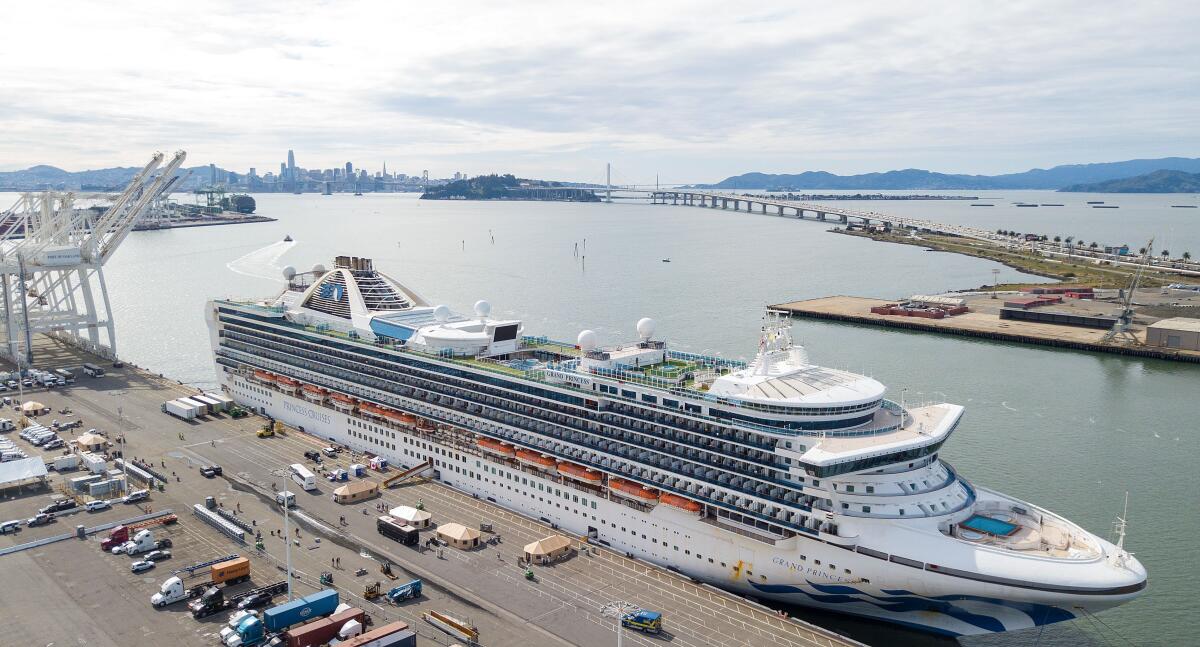A coronavirus side effect: lots of lawsuits

- Share via
Carnival Corp. is facing lawsuits from several passengers who claim they weren’t warned of the high risk of being infected with the novel coronavirus on the company’s cruise ships.
Wells Fargo,, Bank of America, JPMorgan Chase and US Bancorp have been sued by small businesses that missed out on coronavirus rescue loans because, the small firms contend, the banks first processed big loans that generated big fees rather than on a first-come-first-served basis.
Six Flags Magic Mountain is being sued by a theme park fan who objects to the park collecting monthly payments for his membership pass while the park is closed due to the pandemic.
Crisis and calamities spark finger pointing and demands for compensation, and the coronavirus outbreak is no different. Like the pandemic, coronavirus-related legal disputes are likely to be widespread and drag on for years.
“You are going to see more lawsuits,” said Brian Kabateck, an attorney and chairman of the board at Loyola Law School. “They are going to keep coming. Things that you and I can’t even imagine, they are going to be coming.”
A litigation surge followed the Sept. 11, 2001, terrorist attacks, including lawsuits by victims and families alleging that aviation companies and the owners of the World Trade Center failed to anticipate the possibility that terrorists could hijack planes and crash them into buildings.
In the aftermath of Hurricane Katrina in 2005, the U.S. Army Corps of Engineers was sued for its alleged failure to protect New Orleans from the storm’s floodwaters.
Los Angeles police and fire departments, along with insurance companies, were sued after the widespread unrest of 1992, accusing them of failing to protect victims or refusing to pay out insurance claims.
Floods, terrorist strikes, riots and illness generate waves of lawsuits because victims often try to find someone to blame for their misfortunes while opportunistic attorneys will look to capitalize on the crisis, Kabateck said. In addition, companies that put profits ahead of the safety of their customers during a crisis are sure to face lawsuits, he added.
“Here you have a crisis that is not only the likes of which we’ve never seen before, but it affects so many people,” Kabateck said.
The latest litigation surge includes lawsuits by federal, state and local agencies, accusing companies of price gouging on items such as face masks, paper towels and hand sanitizers and selling fake coronovirus cures.
The U.S. Department of Justice shut down a website in March that offered a vaccine kit to fight off the virus for $4.95. The state of Alaska sued a man for buying thousands of N95 masks and selling them at a huge markup. The lawsuit seeks to collect $25,000 in penalties and to force the man to repay the markup price to his customers.
Although the outbreak forced the closure of most civil courts in California since March, that has not stopped attorneys from filing the suits. Getting the cases before a jury is likely to take even longer than usual.
Carnival Corp., the parent company of Carnival Cruises, Princess Cruises, Costa Cruises and others, has been named in several lawsuits, stemming from coronavirus outbreaks on ships that set sail after the virus had begun to spread around the world.
James and Kelea Nevis of Arizona filed a suit against Costa Cruise Lines on April 14 in Florida, claiming they both contracted the coronavirus on a 30-day cruise to the Caribbean on the Costa Luminsoa, which set sail from Florida on Feb. 24.
They claim in the lawsuit that Costa Cruises should have canceled their trip considering the virus had already spread on a previous voyage of the Diamond Princess ship and the CDC issued a statement on Feb. 18, highlighting the risk of infections on a ship.
“If you’re going to still set sail then have precautions in place,” said Jeremiah Lowe, an attorney representing the Nevis.
The lawsuit, which seeks more than $1 million in damages, alleges that the crew of the Luminosa didn’t ask passengers to isolate themselves in their staterooms until March 15, after several passengers already fell ill and were taken off the ship for treatment.
Roger Frizzell, a spokesman for Carnival, said he could not comment on ongoing litigation but added: “Looking back, there are always opportunities for improvement, but we operated our cruise ships based on the direction of government and health authorities, using the best information that was available at the time.”
Suing a cruise line is more complicated than suing most U.S.-based company because some violations that occur on international waters are governed by maritime law and cruise lines also impose a “Carriage of Contract” provision with the sale of each cruise, limiting where and how a passenger can sue, according to legal experts.
“Anyone suing the cruise lines will need to overcome a number of legal and practical hurdles, including where to file, whether they can even proceed through a class action, and whether they can prove that the cruise line had enough warnings about the coronavirus such that they should have done more to prevent the transmittal of the disease,” said Brad Brian, a Los Angeles attorney who represented Transocean, the operator of the Deepwater Horizon oil rig that exploded in 2010 in the Gulf of Mexico.
Southwest Airlines, among other air carriers, has been sued by at least one traveler who says he was not given a refund when his flight was canceled but was only offered credits toward a future flight.
Adrian Bombin filed a lawsuit April 13 in Pennsylvania, alleging that after a flight he booked from Baltimore to Havana was canceled, Southwest denied his request for a refund, offering only a credit for a future flight. He seeks a refund, attorneys fees and any other “relief the court deems reasonable the just.”
A similar lawsuit was filed in Chicago by a Minnesota resident against United Airlines. A Maryland man sued Delta Air Lines Friday on similar grounds in Atlanta.
The U.S. Department of Transportation issued a warning April 3 to all airlines, noting that “The obligation of airlines to provide refunds, including the ticket price and any optional fee charged for services a passenger is unable to use, does not cease when the flight disruptions are outside of the carrier’s control.”
In email statements, both Southwest and United said refunds are one of the options passengers have if a flight is canceled.
Despite such statements, Hassan Zavareei, an attorney representing Bombin, said his client was refused a refund. Zavareei said he plans to sue other airlines for doing the same.
“Because they are in a difficult situation they cannot simply turn around and violate their contract with their costumers,” he said of airlines.
Frankie Ruiz of Los Angeles filed a suit this month against Six Flags Magic Mountain in Valencia and its parent company, saying the theme park is deducting $9.95 from his credit card each month for a membership to enter the park even though the park closed March 13 due to the outbreak.
Disney had a similar policy for its annual pass holders after closing its parks in Anaheim and Orlando in mid-March. Disney later reversed its policy, announcing that pass holder could stop making monthly payments without penalty.
The Six Flags claim seeks to be classified as a class-action suit to include all other members who are being charged a monthly payment. It requests unspecified damages.
The lawsuit says Magic Mountain advertised that the park would be “accessible every day of the year, and that their customers would have access to their parks upon paying a membership fee.” In the lawsuit, Ruiz calls that advertising “ false and misleading.”
In a statement, Six Flags said members who keep making payments will get free upgrades once the parks open and will have their passes extended to make up for the time the parks were closed.
The Six Flags Magic Mountain website page that explains that the park closed because of the outbreak does not mention the option to stop making monthly payments. A Six Flags representative said there is an”easily and readily available” online membership service page that gives people the option to pause or cancel a membership.
The company also mentioned the option of pausing payments on its Facebook page.
More to Read
Inside the business of entertainment
The Wide Shot brings you news, analysis and insights on everything from streaming wars to production — and what it all means for the future.
You may occasionally receive promotional content from the Los Angeles Times.










